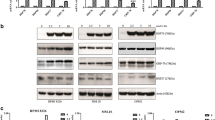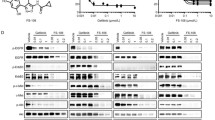Abstract
HSP60 is a mitochondrial chaperone protein that is associated with decreased overall survival of ovarian cancer patients. We determined whether targeting HSP60 with its monoclonal antibody would induce cytotoxicity in sensitive and chemoresistant ovarian cancer cells and whether it is synergistic when combined with chemotherapeutic drugs. Epithelial ovarian cancer (EOC) cells and their docetaxel- or cisplatin-resistant counterparts were utilized. HSP60 mRNA levels were determined by real-time RT-PCR. Cytotoxicity of HSP60 antibody (0.5 or 1.5 μg/ml) alone and in combination with chemotherapy were assessed by MTT Cell Proliferation Assay. Unpaired t tests were used to compare groups for real-time RT-PCR. One-way ANOVA followed by Tukey’s post hoc tests with Bonferroni correction was performed for cytotoxicity comparisons. Significant synergistic effects of the antibody combined with chemotherapy were determined by the CompuSyn Software. Basal HSP60 mRNA levels were increased in chemoresistant EOC cells as compared with their sensitive counterparts (p < 0.05). There was no significant difference in cytotoxicity between EOC cell types; however, treatment with the HSP60 antibody for 24 h showed a dose response (0.5 and 1.5 μg/ml) cytotoxic effect to both sensitive and chemoresistant EOC cells as compared with the isotype control (p < 0.05). Importantly, treatment with both doses of HSP60 antibody was not cytotoxic to normal macrophages. Combination of the HSP60 antibody with docetaxel or cisplatin was significantly synergistic in both sensitive and chemoresistant EOC cells. Here, we identify a novel target that may serve not only for ovarian cancer treatment but also for sensitization of patients to chemotherapy. The cytotoxic effect of HSP60 monoclonal antibody and its synergism with chemotherapeutic agents highlight HSP60 as a promising target for therapy and chemosensitization in ovarian cancer treatment.



Similar content being viewed by others
References
Berek JS, Bertelsen K, du Bois A, et al. Epithelial ovarian cancer (advanced stage): consensus conference (1998). Gynecologie, Obstetrique & Fertilite. 2000;28(7–8):576–83.
Kajiyama H, Shibata K, Mizuno M, et al. Survival benefit of taxane plus platinum in recurrent ovarian cancer with non-clear cell, non-mucinous histology. J Gynecol Oncol. 2014;25(1):43–50. https://doi.org/10.3802/jgo.2014.25.1.43.
Jelovac D, Armstrong DK. Recent progress in the diagnosis and treatment of ovarian cancer. CA Cancer J Clin. 2011;61(3):183–203. https://doi.org/10.3322/caac.20113.
Ling K-S, Chen G-D, Tsai H-J, et al. Mechanisms involved in chemoresistance in ovarian cancer. Taiwan J Obstet Ecol. 2005;44(3):209–17. https://doi.org/10.1016/S1028-4559(09)60143-1.
Craig EA. Chaperones: helpers along the pathways to protein folding. Science. 1993;260(5116):1902–3.
Ghosh JC, Dohi T, Kang BH, et al. Hsp60 regulation of tumor cell apoptosis. J Biol Chem. 2008;283(8):5188–94. https://doi.org/10.1074/jbc.M705904200.
Saini J, Sharma PK. Clinical, prognostic and therapeutic significance of heat shock proteins in cancer. Curr Drug Targets. 2017. https://doi.org/10.2174/1389450118666170823121248.
Ciocca DR, Calderwood SK. Heat shock proteins in cancer: diagnostic, prognostic, predictive, and treatment implications. Cell Stress Chaperones. 2005;10(2):86–103.
Jolly C, Morimoto RI. Role of the heat shock response and molecular chaperones in oncogenesis and cell death. J Natl Cancer Inst. 2000;92(19):1564–72.
Cappello F, Conway de Macario E, Marasa L, et al. Hsp60 expression, new locations, functions and perspectives for cancer diagnosis and therapy. Cancer Biol Ther. 2008;7(6):801–9.
Hjerpe E, Egyhazi S, Carlson J, et al. HSP60 predicts survival in advanced serous ovarian cancer. Int J Gynecol Cancer. 2013;23(3):448–55. https://doi.org/10.1097/IGC.0b013e318284308b.
Abu-Hadid M, Wilkes JD, Elakawi Z, et al. Relationship between heat shock protein 60 (HSP60) mRNA expression and resistance to platinum analogues in human ovarian and bladder carcinoma cell lines. Cancer Lett. 1997;119(1):63–70.
Godwin AK, Meister A, O'Dwyer PJ, et al. High resistance to cisplatin in human ovarian cancer cell lines is associated with marked increase of glutathione synthesis. Proc Natl Acad Sci U S A. 1992;89(7):3070–4.
Lamendola DE, Duan Z, Yusuf RZ, et al. Molecular description of evolving paclitaxel resistance in the SKOV-3 human ovarian carcinoma cell line. Cancer Res. 2003;63(9):2200–5.
Macario AJ, Conway de Macario E. Molecular chaperones: multiple functions, pathologies, and potential applications. Front Biosci. 2007;12:2588–600.
Chatterjee S, Burns TF. Targeting heat shock proteins in cancer: a promising therapeutic approach. Int J Mol Sci. 2017:18(9). https://doi.org/10.3390/ijms18091978.
Wang X, Chen M, Zhou J, et al. HSP27, 70 and 90, anti-apoptotic proteins, in clinical cancer therapy (review). Int J Oncol. 2014;45(1):18–30. https://doi.org/10.3892/ijo.2014.2399.
Hwang YJ, Lee SP, Kim SY, et al. Expression of heat shock protein 60 kDa is upregulated in cervical cancer. Yonsei Med J. 2009;50(3):399–406. https://doi.org/10.3349/ymj.2009.50.3.399.
Castilla C, Congregado B, Conde JM, et al. Immunohistochemical expression of Hsp60 correlates with tumor progression and hormone resistance in prostate cancer. Urology. 2010;76(4):1017 e1–6. https://doi.org/10.1016/j.urology.2010.05.045.
Hamelin C, Cornut E, Poirier F, et al. Identification and verification of heat shock protein 60 as a potential serum marker for colorectal cancer. FEBS J. 2011;278(24):4845–59. https://doi.org/10.1111/j.1742-4658.2011.08385.x.
Giaginis C, Daskalopoulou SS, Vgenopoulou S, et al. Heat Shock Protein-27, -60 and -90 expression in gastric cancer: association with clinicopathological variables and patient survival. BMC Gastroenterol. 2009;9:14. https://doi.org/10.1186/1471-230X-9-14.
Desmetz C, Bibeau F, Boissiere F, et al. Proteomics-based identification of HSP60 as a tumor-associated antigen in early stage breast cancer and ductal carcinoma in situ. J Proteome Res. 2008;7(9):3830–7. https://doi.org/10.1021/pr800130d.
Abdalla MA, Haj-Ahmad Y. Promising urinary protein biomarkers for the early detection of hepatocellular carcinoma among high-risk hepatitis C virus Egyptian patients. J Cancer. 2012;3:390–403. https://doi.org/10.7150/jca.4280.
Tsai YP, Yang MH, Huang CH, et al. Interaction between HSP60 and beta-catenin promotes metastasis. Carcinogenesis. 2009;30(6):1049–57. https://doi.org/10.1093/carcin/bgp087.
Liu H, Xiao F, Serebriiskii IG, et al. Network analysis identifies an HSP90-central hub susceptible in ovarian cancer. Clin Cancer Res. 2013;19(18):5053–67. https://doi.org/10.1158/1078-0432.CCR-13-1115.
Oldham RK, Dillman RO. Monoclonal antibodies in cancer therapy: 25 years of progress. J Clin Oncol. 2008;26(11):1774–7. https://doi.org/10.1200/JCO.2007.15.7438.
Bellati F, Napoletano C, Gasparri ML, et al. Monoclonal antibodies in gynecological cancer: a critical point of view. Clin Dev Immunol. 2011;2011:890758. https://doi.org/10.1155/2011/890758.
Samaranayake H, Wirth T, Schenkwein D, et al. Challenges in monoclonal antibody-based therapies. Ann Med. 2009;41(5):322–31. https://doi.org/10.1080/07853890802698842.
Marqus S, Pirogova E, Piva TJ. Evaluation of the use of therapeutic peptides for cancer treatment. J Biomed Sci. 2017;24(1):21. https://doi.org/10.1186/s12929-017-0328-x.
Author information
Authors and Affiliations
Corresponding author
Additional information
Publisher’s Note
Springer Nature remains neutral with regard to jurisdictional claims in published maps and institutional affiliations.
Highlights
1. Heat shock protein 60 (HSP60) is overexpressed in chemoresistant epithelial ovarian cancer (EOC).
2. Targeting EOC cells with HSP60 monoclonal antibody induces cytotoxicity.
3. Combining chemotherapy with HSP60 monoclonal antibody causes synergistic killing of EOC cells.
Rights and permissions
About this article
Cite this article
Harper, A.K., Fletcher, N.M., Fan, R. et al. Heat Shock Protein 60 (HSP60) Serves as a Potential Target for the Sensitization of Chemoresistant Ovarian Cancer Cells. Reprod. Sci. 27, 1030–1036 (2020). https://doi.org/10.1007/s43032-019-00089-2
Received:
Accepted:
Published:
Issue Date:
DOI: https://doi.org/10.1007/s43032-019-00089-2




